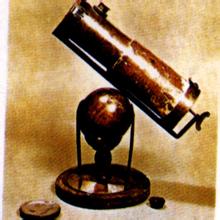Quite what Halley expected to get from him when he made his unannounced visit in August 1684 we can only guess. But thanks to the later account of a Newton confidant, Abraham DeMoivre, we do have a record of one of science's most historic encounters:
1684年8月,哈雷不请自来,登门拜访牛顿。他指望从牛顿那里得到什么帮助,我们只能猜测。但是,多亏一位牛顿的密友--亚伯拉罕•棣莫佛后来写的一篇叙述,我们才有了一篇有关科学界一次最有历史意义的会见的记录:
In 1684 Dr Halley came to visit at Cambridge (and) after they had some time together the Drasked him what he thought the curve would be that would be described by the Planets supposing the force of attraction toward the Sun to be reciprocal to the square of their distance from it.
1684年,哈雷博士来剑桥拜访。他们在一起待了一会儿以后,博士问他,要是太阳的引力与行星离太阳距离的平方成反比,他认为行星运行的曲线会是什么样的。

This was a reference to a piece of mathematics known as the inverse square law, which Halley was convinced lay at the heart of the explanation, though he wasn't sure exactly how.
这里提到的是一个数学问题,名叫平方反比律。哈雷坚信,这是解释问题的关键,虽然他对其中的奥妙没有把握。
Sr Isaac replied immediately that it would be an (ellipse). The Doctor, struck with joy and amazement, asked him how he knew it. 'Why,' saith he, 'I have calculated it,' whereupon DrHalley asked him for his calculation without farther delay, SrIsaac looked among his papers but could not find it.
艾萨克•牛顿马上回答说,会是一个椭圆。博士又高兴又惊讶,问他是怎么知道的。"哎呀,"他说,"我已经计算过。"接着,哈雷博士马上要他的计算材料。艾萨克爵士在材料堆里翻了一会儿,但是找不着。
This was astounding—like someone saying he had found a cure for cancer but couldn't remember where he had put the formula. Pressed by Halley, Newton agreed to redo the calculations and produce a paper. He did as promised, but then did much more. He retired for two years of intensive reflection and scribbling, and at length produced his masterwork: the Philosophiae Naturalis Principia Mathematica or Mathematical Principles of Natural Philosophy, better known as the Principia .
这是很令人吃惊的--犹如有人说他已经找到了治愈癌症的方法,但又记不清处方放在哪里了。在哈雷的敦促之下,牛顿答应再算一遍,便拿出了一张纸。他按诺言做了,但做得要多得多。有两年时间,他闭门不出,精心思,最后他终于成就了一部杰作,自然哲学的数学原理和自然哲学的数学原理,人们习惯称呼它为更好地称为原理。












